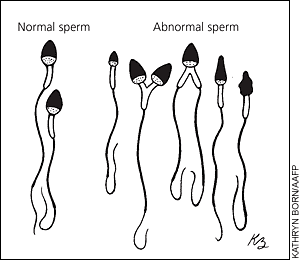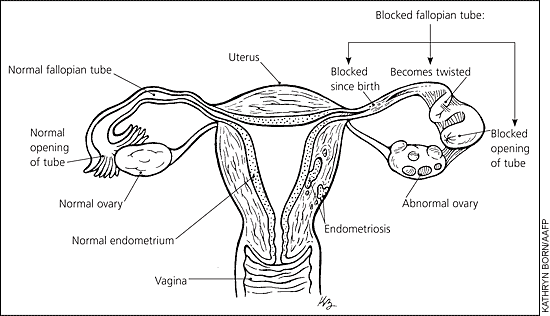
Am Fam Physician. 2007;75(6):857-858
See related article on infertility.
What is infertility?
It is when a couple has tried to get pregnant for at least a year without being able to. About 10 or 15 out of every 100 couples have trouble getting pregnant within one year.
What can cause infertility?
Infertility can be caused by problems in the woman, in the man, or both. Some causes are:
If the man does not have enough sperm or has abnormal sperm (see Picture 1)
If the tubes that carry the sperm in the man are blocked
If the tubes in the woman are blocked (see Picture 2) so that the sperm and egg can't come together (this can happen if a woman has had pelvic surgery or a pelvic infection)
Some medicines
Problems with the woman's ovaries and ovulation (the release of eggs) (see Picture 2)
Problems with the woman's uterus (e.g., endometriosis [EN-doh-mee-tree-OH-sis]; when tissue from the uterus grows in other areas in the pelvis; see Picture 2)


There can be more than one cause of infertility. In one out of five couples, a cause is not found.
How will our doctor find out why we are infertile?
Your doctor will ask you questions and do a physical exam to look for the cause of your infertility. Your doctor may also do blood and semen tests, and ultrasounds or other tests to look at the man's genitals and the woman's pelvis. The doctor may ask the woman to use a home test kit to see if she is ovulating.
How is it treated?
Treatment depends on the cause of infertility. Some women can take a medicine to help with ovulation. Some patients need surgery to repair blocked tubes. Ask your doctor about other procedures that may help.
How likely are we to get pregnant if we are infertile?
The chances of getting pregnant depend on many things, including how long you have been trying, whether you have been pregnant before, and what is causing your infertility. A woman's age is important. The chance of getting pregnant is lower when a woman is older than 35 years. Talk to your doctor about what to expect.
Where can I learn more about infertility?
Your doctor
National Infertility Association
Web site:http://www.resolve.org
American Academy of Family Physicians
Web site:https://familydoctor.org